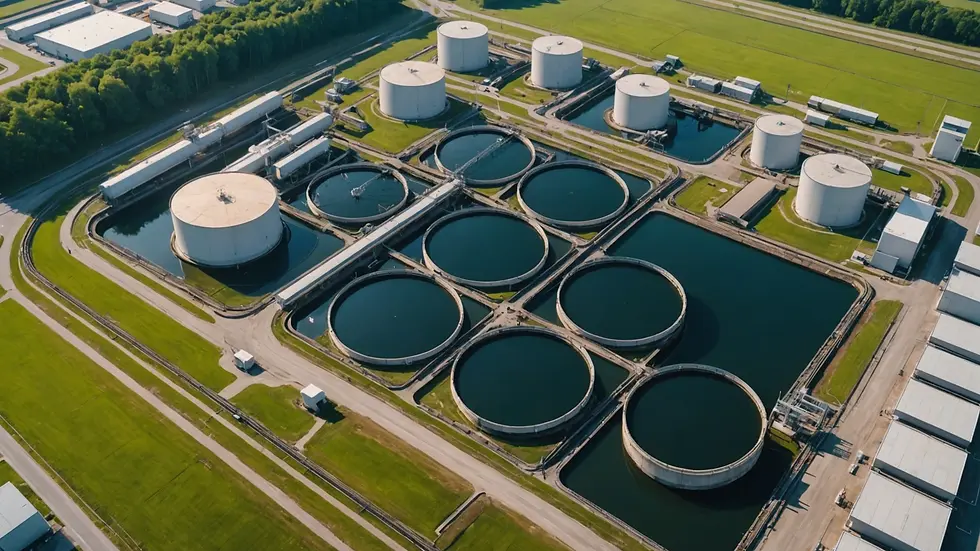- VSI

- Jul 1, 2024
- 3 min read
The Power of Bacteria in Conservation
In recent years, environmental pollution and degradation have become pressing challenges. Researchers and environmentalists are turning to bacteria—tiny microorganisms that play vital roles in sustaining ecosystems—as a potential solution. This blog explores how bacteria contribute to environmental conservation, focusing on their actions and the impact they can have on ecological issues.
The Role of Bacteria in Biodegradation
Bacteria are nature's recyclers, breaking down organic materials and pollutants effectively. They can degrade complex compounds that are typically resistant to decomposition. For example, during oil spills, certain strains of bacteria metabolize hydrocarbons found in crude oil, transforming them into harmless byproducts. One notable strain, Pseudomonas aeruginosa, has been shown to degrade oil pollutants efficiently. Studies reveal that using these bacteria can reduce oil concentrations in contaminated soil by up to 90% within a few weeks.
This unique capability not only cleans contaminated sites but also helps ecosystems restore themselves quickly.

Bacterial Agents in Soil Health
Soil health is essential for a balanced ecosystem, and bacteria are crucial players in this system. They aid in nutrient cycling, enhance soil structure, and support plant growth. For instance, nitrogen-fixing bacteria like Rhizobium convert atmospheric nitrogen into forms that plants can absorb and use. A single Rhizobium colony can increase soil nitrogen content by 40%, boosting crop yields significantly.
Additionally, certain bacteria help suppress soil-borne pathogens, maintaining balance among different microbial communities. This natural process can lead to healthier crops and a reduced need for chemical fertilizers.

These contributions are vital for creating resilient agricultural systems. For instance, farms utilizing bacteria-based treatments have reported up to a 30% increase in crop yields with less chemical input.
Bacteria in Wastewater Treatment
Bacterial agents are also central to wastewater treatment. Wastewater can contain high levels of organic matter that leads to pollution if not managed properly. Specific strains of bacteria are used in wastewater treatment plants to efficiently target and degrade pollutants.
For example, Methanogens are critical in anaerobic digestion processes, converting organic waste into biogas—a renewable energy source. This reduces waste volume by up to 60% while generating energy that can power the treatment facility.
Aerobic bacteria, which thrive in oxygen-rich environments, break down organic matter effectively in activated sludge systems. Their presence enables these facilities to cut pollution levels significantly, resulting in waterways that are at least 70% cleaner.

The partnership between bacteria and engineering in these settings offers a promising approach to improve water quality.
Bacterial Applications in Pollution Control
Bacteria also show promise in controlling pollution, especially from heavy metals. Certain bacterial species have evolved to tolerate and detoxify substances like lead, mercury, and cadmium. For instance, Bacillus and Corynebacterium can absorb heavy metals from contaminated environments. Studies indicate that these bacteria can reduce the concentration of lead in contaminated soil by as much as 80%.
Additionally, microbial fuel cells demonstrate an innovative application of bacteria, where specific microbial communities convert organic pollutants into electricity. This method could potentially reduce pollution while simultaneously generating energy.
Future Prospects in Environmental Conservation
As research on microbial ecology advances, the applications of bacteria in environmental conservation are expanding. Combining biotechnology with microbial processes has the potential to address some of today's most significant ecological challenges.
The critical roles of bacteria in enhancing soil health, treating wastewater, and purifying polluted environments cannot be overlooked. They are essential to natural systems and innovative engineering solutions.
Looking ahead, it is vital to protect these microbial communities and understand their functions in ecosystem dynamics. Continued research and collaboration can position bacteria as essential allies in the pursuit of a sustainable future.
In summary, the use of bacterial agents in environmental conservation holds great promise for combating pollution and supporting ecosystem health. As our understanding of these microorganisms deepens, we can aim for a cleaner, healthier planet for future generations.


Comments